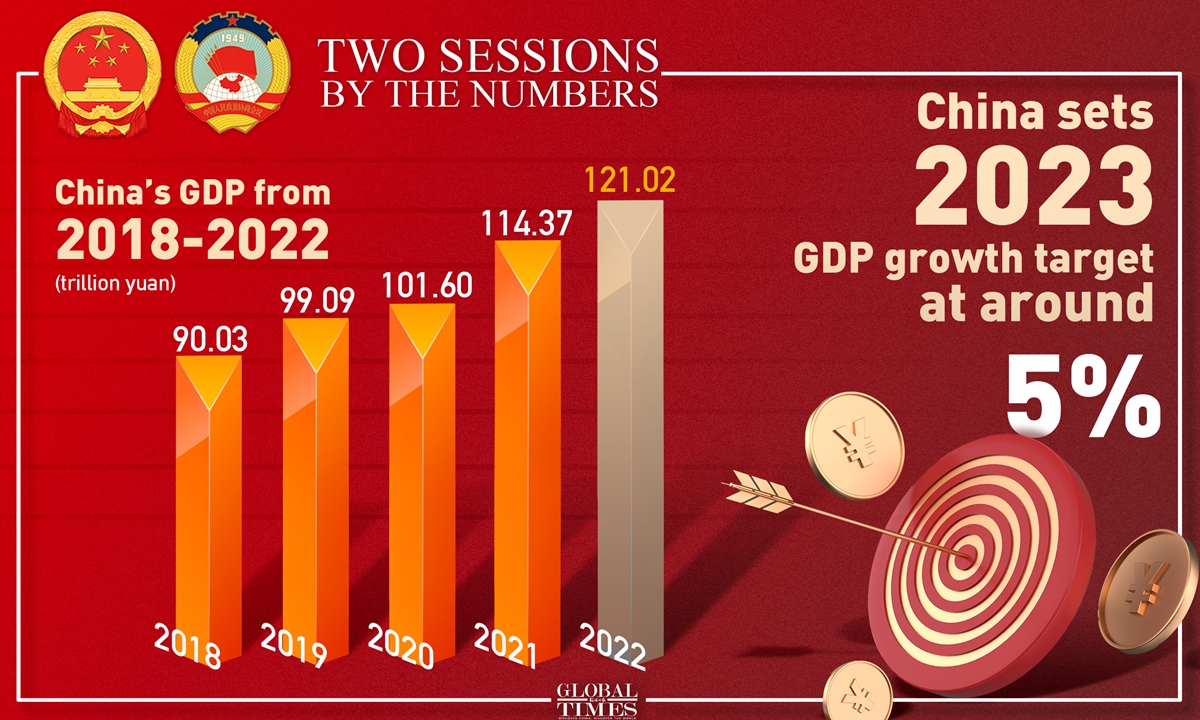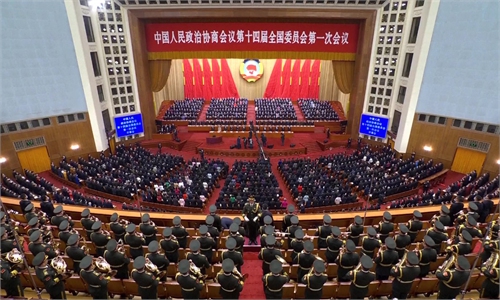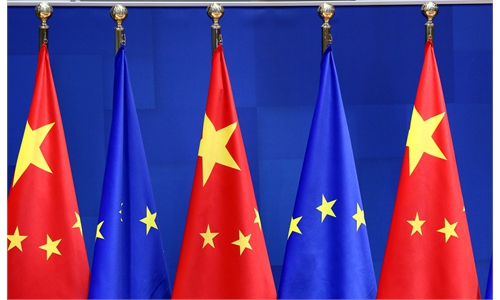China sets GDP growth target at around 5% for 2023, reflecting confidence in economic recovery

China sets 2023 GDP growth target at around 5%. Graphic: Global Times
China set its GDP growth target at about 5 percent for 2023, reflecting the country’s confidence in a nationwide economic recovery after claiming a decisive victory against the COVID-19 epidemic, while also balancing against global economic volatility and geopolitical uncertainty.
The growth target means China will once again become one of the world’s fastest-growing major economies, as the global economy is widely expected to slow down sharply this year and major economies such as the US and the eurozone are grappling with risks of recession.
The growth target is significantly higher than China’s GDP growth rate of 3 percent in 2022 amid severe impact from the epidemic and major disruptions in global supply chains. The target is also in line with forecasts by many international institutions. In previous interviews conducted with economists, most of them forecast that the government will set this year’s GDP growth target at around 5 percent.
The IMF recently forecast a GDP growth of 5.2 percent for China this year and 2.9 percent for global growth.
The GDP growth target, along with other economic development goals, was in the Government Work Report Premier Li Keqiang delivered to the first session of the 14th National People's Congress (NPC), which opened on Sunday.
Economists said that the GDP growth target reflects not only China’s confidence in the economic recovery in post-COVID stage, but also its focus on pursuing long-term high-quality and sustainable development.
“China's GDP will hopefully rise by more than 6 percent in 2023 in reality if the Russia-Ukraine conflict and international unilateralism does not escalate in large scale... But the officials have set the GDP growth target a little slower than that level to show their emphasis on high-quality development and pursuit of a sustainable growth pattern,” Cao Heping, an economist at Peking University, told the Global Times.
According to Cao, the GDP growth target also shows that authorities have taken potentially unexpected factors into consideration, with the biggest factor of uncertainty being changes in the external environment, such as whether some developed economies will plunge into economic recession, which will in turn drive down demands for Chinese exports.
The national growth target is also in line with higher growth expectations from the ongoing economic recovery around the country. Most Chinese provincial-level localities have set their growth targets at above 5.5 percent, according to media reports.
"From central to local governments, Chinese officials have a strong sense of motivation to keep this year's GDP growth at an exhilarating pace, although they are also fully aware of potential headwinds and uncertainties," Tian Yun, an independent economic observer and former economist at the state economic planning agency, told the Global Times.
In the first two months of 2023, China's economy has achieved better than expected performance in areas ranging from tourism, entertainment to manufacturing. Based on the fast recovery, a number of global institutions have also raised forecasts for the country's economic growth this year.
Moody's, for example, recently raised its forecast for China's real GDP growth to 5 percent for both 2023 and 2024, up from previous projections of 4 percent, noting that the government's decision to optimize COVID-19 response will naturally boost the country's economic activities. Goldman Sachs Group also upgraded its forecast for China’s GDP growth this year after China's recovery gathered pace.
Greater contribution to world
Citing the growth targets, economists also stressed that China will become a major driver for global economic growth this year at a time when global economy is bogged down by slowdown risks.
Moody's expected that global growth will continue to slow in 2023, with increasing drag from cumulative monetary policy tightening on economic activity and employment in most major economies. The institution forecasted that Group of 20 (G20) economic growth will downshift to 2 percent in 2023 from 2.7 percent in 2022, according to a report it sent to the Global Times.
Tian said that China’s growth target this year will likely exceed most economies except certain countries that are at early stage of industrialization, like Vietnam and India. "As China's economic growth gathers pace, the country's contribution to global economic growth will also be about 30 percent this year," he said.
Fu Linghui, a spokesperson for the National Bureau of Statistics, noted last year that China's potential growth rate will reduce gradually in the future with China's increasing economic aggregate, but a 5.5-6.5 percent growth range is still at a medium to high level, which shows that China's economy still has relatively strong potential for growth.



